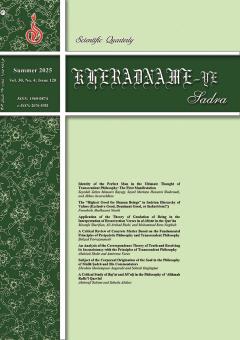An Analysis of the Correspondence Theory of Truth and Resolving its Inconsistency with the Principles of Transcendent Philosophy
Subject Areas : Studies on Mulla Sadra and the Transcendent Philosophy
Abdolali Shokr
1
![]() ,
Amirreza Vares
2
,
Amirreza Vares
2
![]()
1 - Associate Professor, Department of Islamic Philosophy and Kalam, University of Shiraz, Shiraz, Iran
2 - PhD Candidate of Islamic Philosophy and Kalam, University of Shiraz, Shiraz, Iran
Keywords: Correspondence, soul, external world, mind, illumination, nafs al-amr, gradation,
Abstract :
Certainty in any proposition is achieved within the framework of criteria for truth and falsity. The results of self-knowledge, such as the immateriality of the human soul and the immateriality of the reality of knowledge, alongside an external world distinct from the soul and the presupposition of the realization of a physical external world, create significant challenges and inconsistencies, including a lack of certainty and the acceptance of error in the world of being. The presence of the reality of immaterial knowledge with the immaterial perceiver is the only condition for the realization of knowledge for the knower. Accordingly, no argument can be adduced for the existence of a corporeal world. This paper, following a descriptive-analytical method, examines the implications of the correspondence theory of truth based on the principles of Transcendent Philosophy and demonstrates that, irrespective of the causal system and accepting the emanation system, the existing inconsistencies can be resolved. Man, as an emanation of the “Necessary Being and Simple Truth,” has an existential relation with the Exalted Truth, and knowledge is bestowed upon them in an emanative and illuminative manner from the Giver of Forms. The illuminated knowledge is the very existence united with the human soul, which is housed in its essence, and through which it gains existential breadth and individuation. The results of this study indicate that the Exalted Truth grants illumination and expansion to Man’s essence through His Epiphany. Human perceptions are their emanations and God’s manifestations, which are bestowed upon them according to their existential station. Thus, an internal system can be portrayed without the need to accept an external world distinct from the soul, in which the manifestations of Exalted Truth shape the gradual path of Man’s existential evolution internally. Therefore, “nafs al-amr” (truth-by-itself) is a graded truth that manifests in the realm of human existential perceptions, creating an internal journey for them, guiding them stage by stage through the stations of truth, and leading to the expansion of Man’s existence.
ابن¬سینا (1373) شفا، ترجمة مهدی قوام صفری، تهران: فکر روز.
ارسطو (۱۳۸۵) مابعد¬الطبیعه، ترجمۀ محمدحسن لطفی، تهران: طرح نو.
ایمانپور، منصور (1382) «مسئله تطابق ذهن و عین در فلسفه مشاء و حکمت متعالیه»، زبان و ادب فارسی، دانشگاه تبریز، شمارة 186، ص48ـ23.
جوادی آملی، عبدالله (1395) رحيق مختوم، قم: اسراء.
حاجحسینی، مرتضی (1383) «بررسی و تحلیل نظریة مطابقت صدق در فلسفة اسلامی»، هستی و شناخت، شمارة 6، ص123ـ109.
حسن¬زاده آملی، حسن (1383) دروس معرفت نفس، تهران: الف لام میم.
خسروپناه، عبدالحسین (1379) «تئوری¬های صدق»، ذهن، شمارة 1، ص44ـ30.
طباطبایی، سیدمحمدحسین (1364) اصول فلسفه و روش رئالیسم، تهران: صدرا.
طباطبایی، سیدمحمدحسین (1981م) «تعلقیات اسفار» در ملاصدرا، الحکمة المتعالیة فی الأسفار العقلیة الأربعة، بیروت: دار احياء التراث العربي.
عبودیت، عبدالرسول (1393) درآمدی به نظام حکمت صدرایی، ج2، تهران: سمت.
فیاضی، غلامرضا (۱۳۷۸) تعلیقه بر نهاية الحكمه، قم: مؤسسة امام خمینی (ره).
مطهری، مرتضی (1369) حرکت و زمان در فلسفه اسلامی، تهران: حکمت.
ملاصدرا (1380) الحکمة المتعالیة فی الأسفار الأربعة، ج2، تصحیح و تحقیق مقصود محمدی، تهران: بنیاد حکمت اسلامی صدرا.
ملاصدرا (1382الف) الحکمة المتعالیة فی الأسفار الأربعة، ج9، تصحیح و تحقیق رضا اکبريان، تهران: بنیاد حکمت اسلامی صدرا.
ملاصدرا (1382ب) شرح و تعلیقه بر الهيات شفاء، تصحیح و تحقیق نجفقلی حبیبی، تهران: بنیاد حکمت اسلامی صدرا.
ملاصدرا (1383) الحکمة المتعالیة فی الأسفار الأربعة، جلد 1، 3 و 4، تهران: بنیاد حکمت اسلامی صدرا.
ملاصدرا (1384) شرح اصول الکافی، ج3، تصحیح و تحقیق محمود فاضل يزدي مطلق، تهران: بنیاد حکمت اسلامی صدرا.
ملاصدرا (1386) مفاتیح الغیب، تصحیح و تحقیق نجفقلی حبیبی، تهران: بنیاد حکمت اسلامی صدرا.
هاشمی، فاطمه سادات؛ حبیبی، سلیمان؛ علیزمانی، امیرعباس (1393) «نظریه مطابقت و اشکالات وارد برآن»، پژوهشهای معرفتشناختی، شمارة 8، ص51ـ37.
Russell, B. (2011). Our knowledge of the external world as a field for scientific method in philosophy, Gutenberg ebooks.


